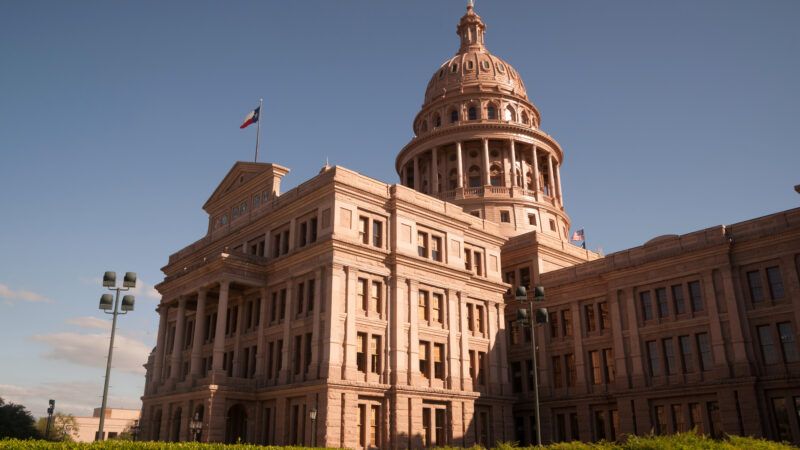Texas Could Blow Its Shot at Leading the AI Revolution
A bad bill inspired by European tech panic threatened to drive out Tesla, Meta, and Nvidia. Lawmakers in the House improved it—but now the bill is stalled in the Senate.

Texas is built for growth: It's got land, talent, and a deep-seated cultural bias toward building over banning. For this reason, companies like Tesla, Meta, and Nvidia are pouring billions into the state. The state was perfectly positioned to lead America's artificial intelligence (AI) revolution—until lawmakers nearly sent these companies fleeing to other states.
The original text of Texas House Bill 149—the Texas Responsible AI Governance Act (TRAIGA)—was a blueprint for how to kill innovation. Modeled after Europe's AI Act and former President Joe Biden's now-defunct AI Bill of Rights, it proposed audits, sweeping risk classifications, and vague compliance mandates that would've buried startups while big incumbents would not have been significantly hindered. It was regulation based on fear, not facts.
But to their credit, Texas lawmakers course-corrected. On March 14, Rep. Giovanni Capriglione (R–Keller) introduced a revised version of TRAIGA that ditched the open-ended audits, the broad "high-risk AI" definitions, and the compliance hurdles that would've applied equally to spam filters and autonomous vehicles. The new version reflected a growing realization: You can protect consumers without kneecapping innovators.
The bill has passed the House and is heading to the Senate—though so far has been left pending in committee.
Even the substitute bill isn't perfect. H.B. 149 would create a new state AI council, impose heavy reporting mandates, and open the door to mission creep without a clear limiting principle. It comes with a price tag north of $25 million and carves out roles for 20 new full-time state employees. Not exactly the small-government energy Texas wants to be known for.
The Texas Senate has the chance to finish what the House started by tightening the bill's scope and guarding against bureaucratic bloat. Texas can lead in AI by scaling back bureaucracy, not building a regulatory empire. Simple fixes could get this bill across the finish line: sunset the AI Council by 2030 unless renewed by the Texas legislature, cap the budget, exempt open-source and small businesses from enforcement overreach, and tie enforcement to actual consumer harm rather than theoretical risks.
Virginia already nailed this. Just 10 days after the revised Texas bill was introduced, Republican Gov. Glenn Youngkin vetoed H.B. 2094, a similarly heavy-handed AI bill. His message was clear—the legislation would stifle job creation, repel business investment, and punish smaller firms that don't have legal departments on speed dial. It would've cost the state's AI ecosystem nearly $30 million in compliance overhead.
Even California got the memo. Democratic Gov. Gavin Newsom vetoed S.B. 1047, which would have imposed strict liability, mandatory "kill switches," and speculative rules targeting general-purpose AI. Newsom warned against taking a "California-only" approach that wasn't backed by science or national coordination. When California, of all places, warns against overregulating tech, you know the pendulum is swinging.
These three states were being sold the same faulty product.
A bipartisan coalition "of over 200 state lawmakers from more than 45 states" called the Multistate AI Policymaker Working Group (MAP-WG) has been spamming statehouses with copypasta legislation designed to look thoughtful, but built on the same anti-tech, anti-growth assumptions. These bills aim to regulate hypothetical risks, not real harms, even though there are existing civil rights and consumer protection laws that already address the latter.
Colorado was the test case. It passed one of these bills last year and has been cleaning up the mess ever since. Democratic Gov. Jared Polis had to create an AI task force to deal with concerns from startups and mid-sized companies warning of job losses, capital flight, and regulatory confusion. The task force offered little more than vague suggestions and no real fixes.
Meanwhile, the federal stance has shifted hard in the other direction. President Donald Trump repealed Biden's AI executive order in January, replacing it with a framework focused on tearing down barriers to innovation and maintaining U.S. dominance in the field. Vice President J.D. Vance, speaking in Paris, nailed the problem: "Excessive regulation of the AI sector could kill a transformative industry just as it's taking off."
Texas has a chance to lead—not just by avoiding Europe's mistakes, but by setting a national standard for how to do AI regulation right: focused, limited, and innovation-first.
Other states, like New York, are still stuck fighting yesterday's fears. Texas is poised to build tomorrow's breakthroughs—if lawmakers finish the job in the Senate.


Show Comments (6)